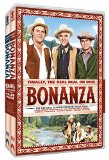| Reviews & Columns |
|
Reviews DVD TV on DVD Blu-ray 4K UHD International DVDs In Theaters Reviews by Studio Video Games Features Collector Series DVDs Easter Egg Database Interviews DVD Talk Radio Feature Articles Columns Anime Talk DVD Savant Horror DVDs The M.O.D. Squad Art House HD Talk Silent DVD
|
DVD Talk Forum |
|
|
| Resources |
|
DVD Price Search Customer Service #'s RCE Info Links |
|
Columns
|
|
|
Bonanza: The Official Seventh Season, Volumes 1 & 2
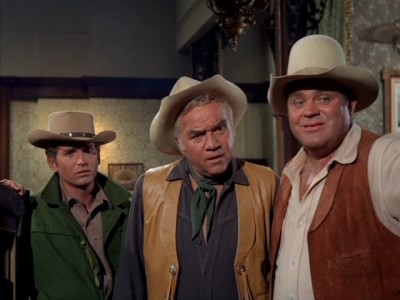
It's the early 1960s, and gold and silver fever are sweeping through the hills and valleys of the celebrated Comstock Load. Virginia City, Nevada, sitting right on top of those millions of dollars' worth of ore, is bustling with miners, settlers, businessmen, rustlers, con artists, and killers. And butting right up against Virginia City is the massive Ponderosa ranch, a thousand-square mile New World Eden filled to the brim with pine and beef. Overseeing this operation is voice-of-God Ben Cartwright (Lorne Greene), the thrice-widowed land baron who watches over his spread as fiercely--and as tenderly--as he does his three two grown sons. Ben's eldest, Adam Cartwright (formerly played by Pernell Roberts), has taken a powder and gone back East (or further West...or to the sea. It changes...). Middle son Eric "Hoss" Cartwright (Dan Blocker) gets his massive physique from his mother, a six-foot tall Swede who reportedly could punch like a mule. Hoss, who may seem rather dim or naive at times when he's not knocking down a tree with his bare hands, is in reality quite sensitive to his surroundings and to the sufferings of others--particularly animals and small children. Finally, Little Joe Cartwright (Michael Landon), the youngest son, gets his smoldering dark looks and equally tempestuous nature from his beautiful half-Creole mother, whom Ben met during a trip to New Orleans' French Quarter. Little Joe is certainly the most reckless of the clan, relying on his charm and his fast fists to both get him into trouble, and out of it again...especially if there's a lady involved. Protective of the Ponderosa, which they carved out of the wilderness, the Cartwrights nonetheless inevitably get involved week after week in the troubles of others, who look to these land barons as one of the few stabilizing forces in the wild and wooly excesses of the Old West.
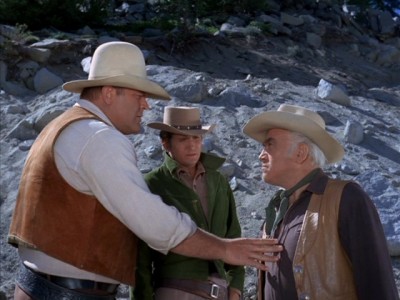
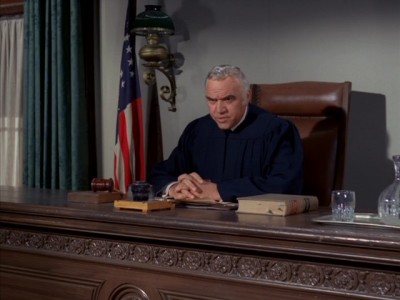
In my previous reviews of Bonanza, I wrote extensively about the series' inception and its production, as well as its aesthetic and thematic elements--elements that helped make Bonanza one of the finest examples of the TV Western genre, remaining remarkably consistent over its first six seasons (you can read those reviews here). So I'll try not to cover the same ground in this review...which won't be too hard, considering the changes this season. Certainly, the loss of Pernell Roberts' "Adam" character in this seventh season is a major divergence from the show's wildly successful formula. Roberts never made any secret about his unhappy feelings while working on Bonanza, including almost walking after the fifth season, before he was reluctantly persuaded to stay for just one more go-around. There was a lot of speculation from writers and critics at the time (as well as from the production staff and the other cast members) over whether or not Bonanza would survive the loss of so integral a character (in an interview extra in this set, Dan Blocker looks clearly worried when addressing this critical issue). After all, this was a time in TV history when safe, comfortable continuity was king with networks keen not to put off viewers. Add to that Bonanza's central appeal as a family drama, and the loss of one of those family members had to be a frightening prospect for the makers of such a successful enterprise. Had Bonanza dipped in the Nielsen rankings for this 1965-1966 season--it had finally reached the vaunted number one slot in its previous sixth go-around--the critics would have immediately latched onto Roberts' absence as the reason for the numbers tumble (and one would assume that suitably imperative--and expensive--efforts would have been made to bring him back into the fold). As fate would have it, though, Bonanza hung tough and survived a blow that should have crippled it. When the dust settled at the end of the 1965-1966 viewing year, Bonanza stayed at number one (as it would for the following eighth, too), and everyone, quite quickly, forgot all about Pernell Roberts, only mentioning him in passing in the years to come as an example of one of the most spectacular career miscalculations in television history (you can pretty much gauge Bonanza's creator David Dortort's feelings about this defection--despite subsequent offers from an eventually chagrined and ultimately wiser Roberts to return for guest spots...Dortort politely declined).
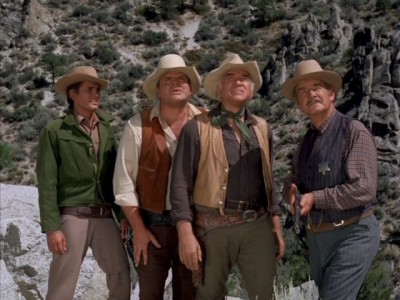
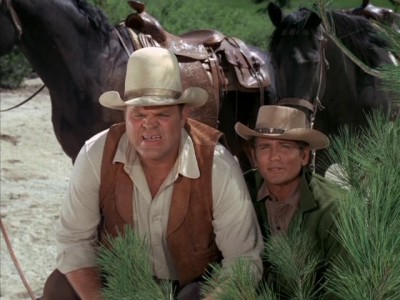
Nobody, though, seems to have written that they didn't like Bonanza as much, with Pernell Roberts gone (I couldn't find anything written at that time period expressing such feelings). Apparently, since the show remained first in the ratings, that was proof positive for many that the show's formula, its aesthetic, and its production was bigger than its core cast (...something that wouldn't be said in its final season, after the sudden death of Dan Blocker). So why then did I feel a small but persistent sense of disappointment while watching this seventh season of Bonanza, when it finally sank in that Roberts was gone for good? I could certainly claim prejudice and admit that he was my favorite Cartwright (followed in order by Ben, Hoss, and Little Joe). However, the nagging problem is bigger than personal preference (after all, Roberts wasn't in every episode, so he obviously wasn't the "whole show"). Going back to my first season review, the answer lies in the cleverly designed Cartwright family schematic. As I wrote, Bonanza deepened the reach of its drama anthology format by having the Cartwright brothers come from different mothers (who are all conveniently deceased), allowing these three characters to share seemingly nothing from their father except a loyalty to the family name and of course, to the Ponderosa (many jokes were made at the time about the improbability of Lorne Green fathering these adult men). Cleverly, the Cartwrights not only represent huge geographical swaths of potential TV viewers (cerebral Adam = East Coast; hothouse flower Little Joe = the South; expansionist Ben = the West; and Hoss' Swedish background taking care of the Northern states, and his wide-open generosity and "plain folks" hominess taking care of the Midwest), they also stand in for clearly established male fantasy figures for both men and women (something The Big Valley borrowed later). If a businessman watching Bonanza fancied himself the tycoon of his small appliance shop, or a harried father sitting down in front of the TV looked on approvingly at the Cartwright clan, then patriarch Ben was an ideal--and idealized--father/authority figure. And if those men's wives happen to sit down to watch, as well, they might allow themselves to dream of the hurried, impassioned, impetuous advances of youngster dreamboat Little Joe...before, perhaps, moving up to the darker, more sophisticated lovemaking techniques of coolly intelligent, mysterious Adam. And of course, the kids sprawled out on the floor in front of the set didn't have to wait too long inbetween all the talking for someone to take a shot at someone else, or for Hoss to haul off and take someone's head off with a massive swipe of one of his ham-fists (gentle giant Hoss had to be the favorite Cartwright of the small-fry demo).
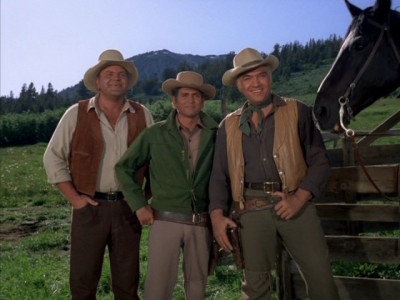
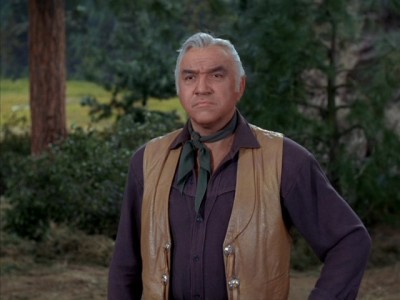
With Roberts out of this picture, that family/fantasy figure dynamic is necessarily weakened. Bonanza no longer truly has "something for everyone" when it lost the sophisticated, cynical, sexually dangerous and frequently emotionally conflicted Adam (really the existential opposite of the rough-hewn, eternally optimistic, sexually neutered Hoss character). Bonanza's storylines still ran the gamut from action-oriented plots and explorations of controversial subjects like racism, to flat-out comedic outings filled with slapstick. How well they ran that gamut is open to debate by this seventh season. After watching these 33 one-hour episodes (a routine number back then for the industrious Hollywood TV factories that now looks like an impossible accomplishment in comparison to today's paltry "full season" offerings), I'm not sure I spotted more than a few that were the equal of episodes like Robert Altman's bizarre Sam Hill or Ward Hawkins and William Witney's hilarious The Infernal Machine from season two, or the potent, disturbing fantasy, Song in the Dark, from Judith and George George, and the sublime Any Friend of Walter's, from Lois Hire and John Florea, from season four, or season five's Ponderosa Matador, from Alex Sharp, or a terrific anti-hero "Adam" outing from season six, Thanks for Everything, Friend. These seventh season shows still feature many of the same concerns from previous go-arounds, but they're not as sharply defined, or as enthusiastically put over, as those earlier seasons. And clearly, a vital interpreter of and commentator on those various thematic elements--what was Adam if not the quiet, sardonic observer, frequently sneering or shaking his head in the background--is gone, making Bonanza now feel just a little bit less varied, a little less nuanced...and frankly, a whole lot more ordinary.
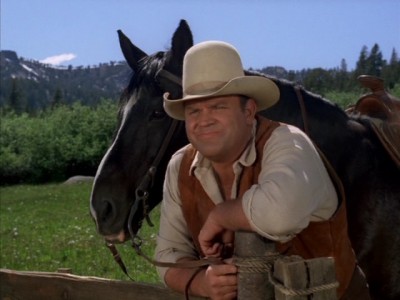
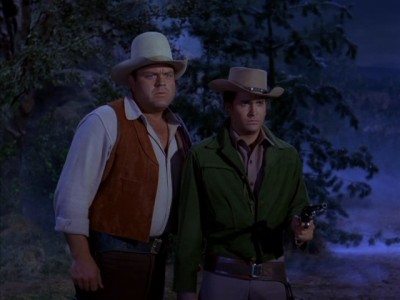
And the underwhelming season opener is the first indication that all is not 100% on the Ponderosa anymore. The Debt, from William Blinn, patches together the standard Bonanza "stray taken in and elevated by example" subplot and the too-familiar "fugitive(s) on the run into the mountains" device seen in so many TV oaters...and combines them to remarkably little effect. Aside from a cute scene where Landon tries to teach Brooke Bundy to read, the plot points are surprisingly predictable, while the production uncharacteristically sloppy (when the Cartwrights take fugitive father Ford Rainey back down to Virginia City, they leave kids Bundy and Tommy Sands--quite good here--in the cold hills to wander off on their journey...sans horses, food, clothes, or equipment). Much better is John and Ward Hawkins' The Dilemma, where Ben is appointed a temporary circuit judge, with his first case being a doozy: old town nemesis Tom Tully has cracked the bank's safe, bankrupting Virginia City...and he won't tell where the money is unless he gets a pardon from Ben. A solidly-built, cynical look at the forces that come into play whenever the powerful seek to circumvent the absoluteness of the law for their own personal gain (are we listening, Imperator?), with an equally absolute, morally-superior Cartwright resolution (justice is served, the law is honored, and the criminal gets a break). In Paul Schneider's The Brass Box, intriguing questions about how, exactly, Ben formed the Ponderosa are frustratingly side-stepped in an otherwise engrossing episode: town joke Ramon Navarro (startlingly good here) claims to have old Mexican government land grants that show he's the owner of the Ponderosa, and now his violent, vengeful nephew Michael Dante (equally good and snarling) is ready to serve those papers on the hated patrons, the Cartwrights. You can tell that someone made sure the few unanswered accusations about how Ben acquired his ranch stayed unanswered in the final script--a cheat that robs The Brass Box of any lasting impact (this is also the first time Adam's disappearance is mentioned: he's merely "away"). Still...it's interesting to see Ben take the high road and prepare to give everything up if the papers proved to be legal--something we all know isn't ever going to happen (the ending is pleasantly ambiguous enough for us to wish this promising episode hadn't been so timid in other aspects). The Other Son, from Thomas Thompson, is a no-nonsense Western Wages of Fear rip-off that finds Ben and the boys participating in the deadly portage over the mountains of nitroglycerin, with the aid of the dysfunctional Watsons family. Suspense is expertly delivered here in equal doses with the primal familial drama: hair-trigger Ed Begley idolizes his similar, first-born son Tom Simcox...and despises his bookish, sensitive son Richard Evans, whose birth caused the death of Begley's wife. Lots of evocative location shooting for this one...but who okayed those final scenes where the Cartwrights throw around those volatile boxes of nitro like nerf footballs?
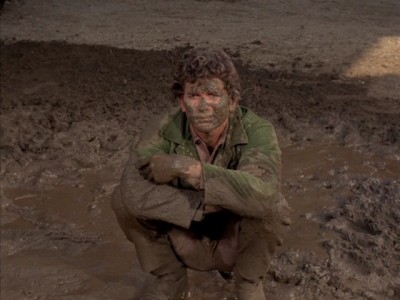
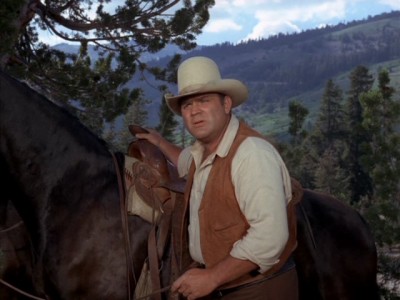
Another nicely-informed actioner from Thomas, The Lonely Runner, follows, when Gilbert Roland takes off with a beloved mare when a judge orders the horse to be given to cruel Ken Lynch. This is yet another instance where the Cartwrights act as above-reproach agents of the law: their moral standing is already well-known, so they fully expect and depend on others to see their motives as pure and without potential for personal gain. Exciting action here--the finale on the mountain top, with the mare refusing to leave self-sacrificing Roland, is nicely realized--off-set by a melancholy tone (Roland, an accomplished actor when he wasn't enjoyably hamming it up, is terrific here; watch the sensitivity he brings to a scene where he conveys how he simply can not settle down into a stable life). An embarrassingly bad entry for any series--let alone a show as consistently upper-scale as Bonanza--Devil on Her Shoulder, from Suzanne Clauser, is a hysterically overwrought tale that finds the Cartwrights caught up in a tale of religious intolerance when John Doucette's fundamentalist "flat earthers" get the heebie-jeebies every time Ina Balin questions orthodoxy. Whether it's the frenzied clan cracking whips around a roaring fire while chanting, "Satan's Daughter! Go out! Your House is Burning!" (Hammer wouldn't have touched that shtick with a ten foot pentagram), or Doucette, a good actor coming over seriously stupid here in one badly overplayed scene after another, or Landon and Blocker looking superior and smug and insufferable as they sneer at the poor religious boobs who quake at the sight of St. Elmo's Fire, Devil on Her Shoulder is laughable--something I thought I would never see on Bonanza.
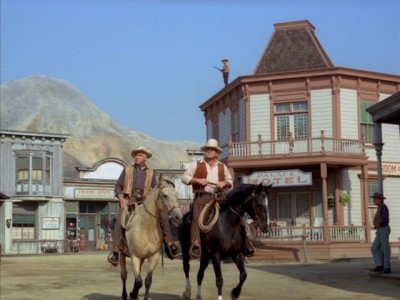
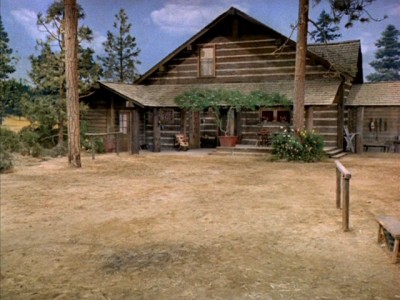
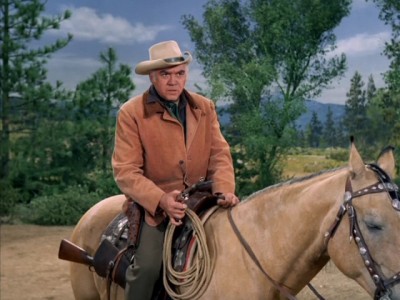
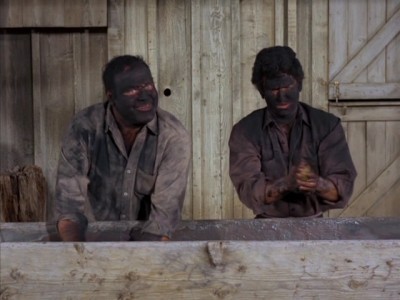
A Natural Wizard, from William Blinn, features yet another townie pissed off at the Cartwrights, who "have everything." Drunk Jacqueline Scott ignores her son Eddie Hodges, blaming the sensitive, animal-loving boy for his father skipping out on them. Of course the Cartwrights take him under their wings, until he finds his path in life: veterinarian assistant. Blinn follows this one up with the provocative All Ye His Saints, an irresistible little fable where Clint Howard, convinced he's found "God" up on a mountain, asks mean-spirited hermit Leif Erickson to save his injured father. Spectacular Lake Tahoe mountain footage enhances this effective story that functions well as both action suspenser and thought-provoking allegory (Howard, such a fine, natural little actor, is perfectly matched by that always underrated Leif Erickson, who hits all the right notes). Two steps back, though, for Mort Thaw's pedestrian, meandering The Dublin Lad, where Little Joe questions his own conduct while sitting on a murder trial jury (when I saw a boom mike shadow on a painted backdrop, I wondered if I was really watching a Bonanza episode). Michael Fisher's To Kill a Buffalo, one of the best offerings this season, starts off amusingly as Hoss tries to "civilize" Ute wildcat Jose De Vega (big laughs when he comes down innocently naked when Hoss is entertaining a future fiance), but it quickly becomes serious (and quite meaningful) as Jose learns he's not going to be welcomed into White society. At the end, he rejects school and returns to the mountains, with Hoss' blessing (this one perfectly illustrates the almost mythical healing powers of understanding and tolerance and love that can be found at the Ponderosa: Jose says the ranch was his school, where "love is better than hate. Understanding stronger than knives, friendship is wiser than war,"). The best contender this season for a "series best" offering would probably be the two-part (Bonanza's first) Ride the Wind. Scripted by Paul Schneider, and directed by William Whitney, this relentlessly grim exploration of the founding of the Pony Express could easily have found its way onto the big screens of 1965, such is its genuine sweep, matched with a nuanced, thematically dense plotline (...and that's just what happened with Ride the Wind--to take advantage of Bonanza's huge international audience, it was slapped together and released in motion picture theaters outside of the U.S.). Exciting, violent action contrasted by a cynical take of the marriage between publicity and business to create American "myths," Ride the Wind feels like it's telling us something new and very old at the same time, in an unremittingly downbeat fashion--the kind of historical-tinged dramatics that Bonanza could do better than any other show (compare this to say, an entertaining but facile Bronco episode with a historical character thrown in as a new victim of target practice). The cast, including Victory Jory, Rod Cameron (typically fine), DeForest Kelly (always better playing a rat), and Stewart Moss among many others, is excellent. A significant achievement in the overall series.
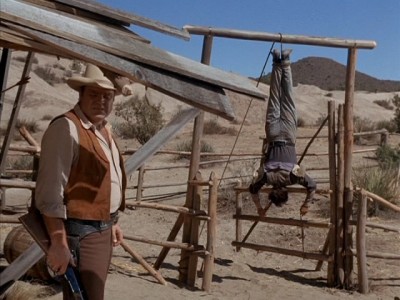
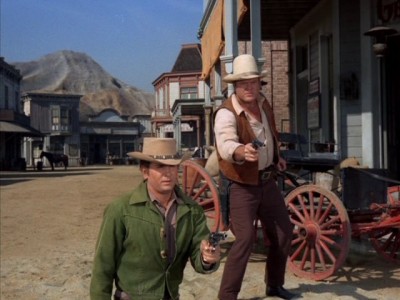
Another series best, this time from Robert V. Baron, Destiny's Child, starts off as an amusing Of Mice and Men knock-off, with little Walter Burke achieving quiet, marvelous chemistry with hulking Dick Peabody as these strays are but the next project for the Cartwrights (in a self-reflexive moment, Ben emphatically states no more strays for the Ponderosa...as if that is going to happen). Very quickly, though, Destiny's Child turns quite mournful (there's a beautifully sad scene between Greene and Peabody, as they talk of stars in the heavens and crying clowns, before Greene reads to him like a child, and Peabody weeps alone), and then increasingly unsettling as Peabody abducts a small boy and is hunted down. An uncompromising end marks this one as quite special. The steady roll of fine episodes continue with Peace Officer, an anxious, nasty-toned outing from Don Mullally, with Rawhide's Eric Fleming perfectly cast as a vicious, uncompromising law officer barely able to contain his murderous rage. An interesting look at the liberties we give up when we allow authority to "protect us," as well as the shifting perspective of guilt (the punk kids don't deserve to die...but the punk that shoots murderer Fleming gets no sympathy from Little Joe, either). Sidney Ellis' The Code doesn't tread any new ground--gunslinger George Montgomery, working a deadly scam with Robert Ellenstein to sucker young guns into fatal, not to mention lucrative, shootouts, is finally having qualms of guilt--but it does give Landon a chance to shine in the kind of episode he does best (I far prefer the talented Landon when his youth and toughness are challenged and tested, rather than his romantic or comedic outings), while Montgomery is uncommonly solid. Jo Pagano's Three Brides for Hoss unfortunately breaks the winning streak with what should have been a sure-fire winner: mail order brides start piling up at the Ponderosa doorstep, and Hoss has no idea why. Director Ralph E. Black gets a few funny scenes in, like the cartoony shot of Hoss eluding two marauding females; however, far too much time is spent on the brides and potential outside suitors, and not on Hoss (...and the actors portraying those couples aren't particularly funny).
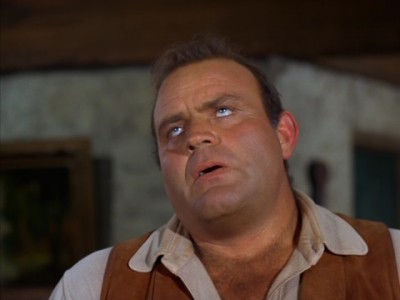
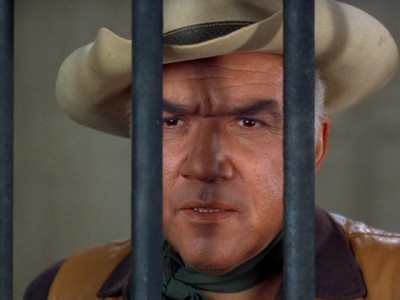
The Emperor Norton, by Robert Sabaroff, doesn't come close to conveying the whimsical madness of its real-life inspiration, with Sam Jaffe pulling his same wide-eyed, frizzy-haired shtick we've seen countless times before from him. Mort Thaw creates a real romantic tearjerker for Lorne Greene in Her Brother's Keeper, where Ben Cartwright's preternatural ability to forgive anyone who's done any kind of dirt on him is put to the test when he falls in love with Nancy Gates...who's being controlled by weak, repulsive scammer Wesley Lau. When Greene lays down that deep baritone/bass combo, he's an effective romantic lead (there's always a hint of sad, restrained desperation to his courting that's perfect for the show: female love interests don't last long in an ever-changing drama anthology). Helen B. Hicks' The Trouble with Jamie is an entertaining, frequently funny coming-of-age outing, where Ben is stuck with shaping up his snotty, East Coast richin' nephew Michael Burns (Blue Boy!). Featuring yet another father who resents his son surviving childbirth after the mother dies, Greene's steady, calm, compassionate, ass-whipping style of making a man out of Burns is nicely tempoed, and believe it or not...rather believably wrought by the good cast (it's hilarious, in contrast to so many other characters who have genuflected in front of the Ponderosa, to see Burns take one look at the ranch and sneer, "So this is the fabled Ponderosa...Well, it's a nice spot for a forest fire,"). A nice lead turn from pretty newcomer Judi Rolin is about the only thing to recommend from Elliot Gilbert's Shining in Spain, a fairly standard love outing for Little Joe, with few surprises in its story of a dreamer daughter awakened to the realities of her idealized, feckless father. A believable turn by the lead actor in The Genius is what's lacking here in Don Mullally's story about a drunken poet finding refuge (where else?) at the Ponderosa. The set-up is solid, but good background actor Lonny Chapman just doesn't have "it" to come across as doomed and poetic and larger-than-life in his self-destructiveness. A missed chance here.
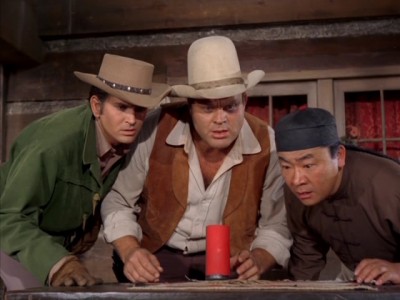
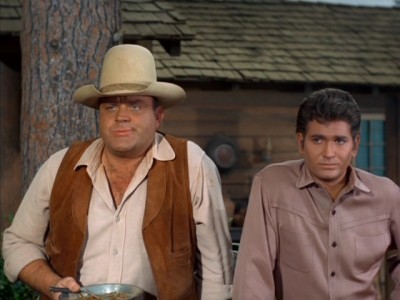
I'll admit right up front that I couldn't really concentrate on the value of Jo Pagano's and William Blinn's too familiar script for The Unwritten Commandment, where a son yearns to be singer despite his stern father's exceptions (Jolson sings again!), because the sight of Wayne Newton with all that make-up on gave me the creeps (to be fair...he's actually pretty good here: sincere, engagingly modest, and natural). Gerd Oswald directed this...but you'd never guess it. As for William Leicester's and Richard Bartlett's loud, unfunny Big Shadow on the Land, one can only hope that line reading directions weren't included in the script, as well, since usually competent, enjoyable Jack Kruschen is so miserably over-the-top as a too-cute-to-live, colorfully loud, and hugely sentimental Italian immigrant battling with the Cartwrights over land rights (I hope a getaway car was nearby after those hold-your-nose takes...). Robert Goodwin's two-fisted boxing tale, The Fighters, won't surprise you with its storyline, but the actors are good (Michael Conrad looks a little silly, though, with those skinny legs which the producers try to hide with tights), and there's an epic fist fight in the streets of Virginia City that ranks with the series' best. George Slavin's and Stanley Adams's Home from the Sea is an excellent inversion of the tried-and-true Bonanza story hook: a stray is taken in and reformed. Here, a surrogate for Adam, seafarer Alan Bergmann (excellent), who could never find his place in the world, his "marker," is given the home he's always wanted...before he betrays Ben's fatherly friendship. Although he reforms at the very end, he doesn't escape his crime of disloyalty, leading to a genuinely moving fade-out (as he slips away, Alan tells Greene, "I never knew people like you before. I always wanted a place like this. A place where I belong," to which a clearly moved, saddened Greene intones, "I wish I could have helped you find your marker." Beautiful--you really buy Greene when he has lines like that). There's certainly the temptation to say Vietnam has come to the Ponderosa when you see that 1966 copyright on William Douglas Lansford's and S.S. Schweitzer's The Last Mission, but there had been lots of cavalry outings on TV and the big screen to feature racist mass murderers like R.G. Armstrong here, looking to avenge his murdered wife and child by wiping out every last Indian. Particularly well done, with Greene matching old pro Armstrong in a tough role. Finally, the season ends on a high, high note with the beautifully-realized spoof, A Dollar's Worth of Trouble from Robert Goodwin. Hoss and Little Joe don't realize it, but they're getting conned from gypsy Mabel Albertson and her accomplice, Sally Kellerman. Complicating matters is the arrival of Kellerman's boyfriend--the most deadly gunfighter in the west, Hampton Fancher. Fancher creates a marvelously funny parody of the Pallidin-type of gunslinger killer, complete with nervous disposition, near-sighted stumblings, and a hilariously accentuated sense of his own importance (when they isolate the audio track to just the sound of his stupid spurs jingling, the effect is quite modern-feeling...and hysterical). A cartoony, frenetic goof engineered by director Don Daves that ends, appropriately enough, with a huge Looney Tunes explosion. It's just too bad there weren't more entries like it for this seventh go-around.
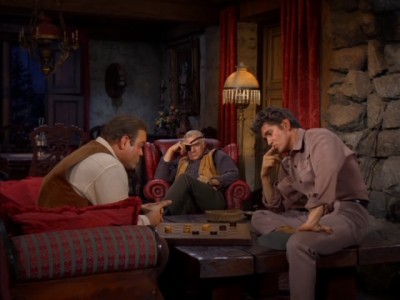

The Video:
Excellent. The fullscreen, 1.37:1 color transfers for Bonanza: The Official Seventh Season, Volumes 1 & 2 look sharp and crisp, with mostly correct color, good contrast, light grain, and few screen imperfections.
The Audio:
The Dolby Digital English split mono audio tracks have been cleaned up and re-corded with little if any hiss and at a vigorous level. English subtitles are available.
The Extras:
No questions the extras are still impressive for this seventh set of DVDs...but it feels like Paramount is starting to dial them back. Only two commentary tracks this time out (four was the usual number for the previous seasons)? DVD producer Andrew J. Klyde delivers one for part II of Ride the Wind (I always look forward to the wealth of solid info from this Bonanza expert...but his delivery is becoming really mannered, for some unknown reason--it's a tad distracting), while Clint and Rance Howard talk about All Ye His Saints (I praised the two for their funny, informative commentaries on the Gentle Ben discs...but there's a lot of silence here for this one). Plenty of episodes feature the original NBC promos, bumpers, and commercial tails we've come to expect in these sets, including the Cartwright boys selling those sweet, sweet big block Chevys (I love the commercial where Hoss gets in a Fleetside truck and smashes sagebrush like Wayne in Hatari). Photo galleries with helpful text are also plentiful. An interview from 2011 with an informative, spirited Michael Dante is fun (looks damned good for 80, the s.o.b.), but I can't say the same for the complete 1965 TV interview of Dan Blocker with Richard "Cactus" Pryor (a small bit of which appeared on an earlier DVD set). When Blocker says with all seriousness that, "the only people I know who aren't [liberal and progressive] are people who are unhappy and life's been a big disappointment to them," a lot of that on-screen good feeling I had for him drained away. We get the "theatrical" version of the European movie release of Ride the Wind (complete with what looks like PAL jiggering), while that cool Impact '66 sales film from Jam Handy and Lorne Greene is the kind of stuff I live for in vintage TV releases. In comparison to any other vintage TV release this year, that's an impressive amount of extras...but it's not as much as the previous sets.
Final Thoughts:
Maybe they should have brought back Barry Coe. The ratings stayed at number one for Bonanza this season, despite the absence of Pernell Roberts as Adam Cartwright. That doesn't mean, though, that the series, faltering anyway in the story department, is still just as good without him. It isn't. However, what is here is often entertaining, and fans of the series won't be disappointed...too much. Even with the many problematic episodes, and the loss of Roberts, I'm still highly recommending Bonanza: The Official Seventh Season, Volumes 1 & 2.
Paul Mavis is an internationally published movie and television historian, a member of the Online Film Critics Society, and the author of The Espionage Filmography.


|
| Popular Reviews |
| Sponsored Links |
|
|
| Sponsored Links |
|
|
| Release List | Reviews | Shop | Newsletter | Forum | DVD Giveaways | Blu-Ray | Advertise |
|
Copyright 2024 DVDTalk.com All Rights Reserved. Legal Info, Privacy Policy, Terms of Use,
Manage Preferences,
Your Privacy Choices | |||||||









